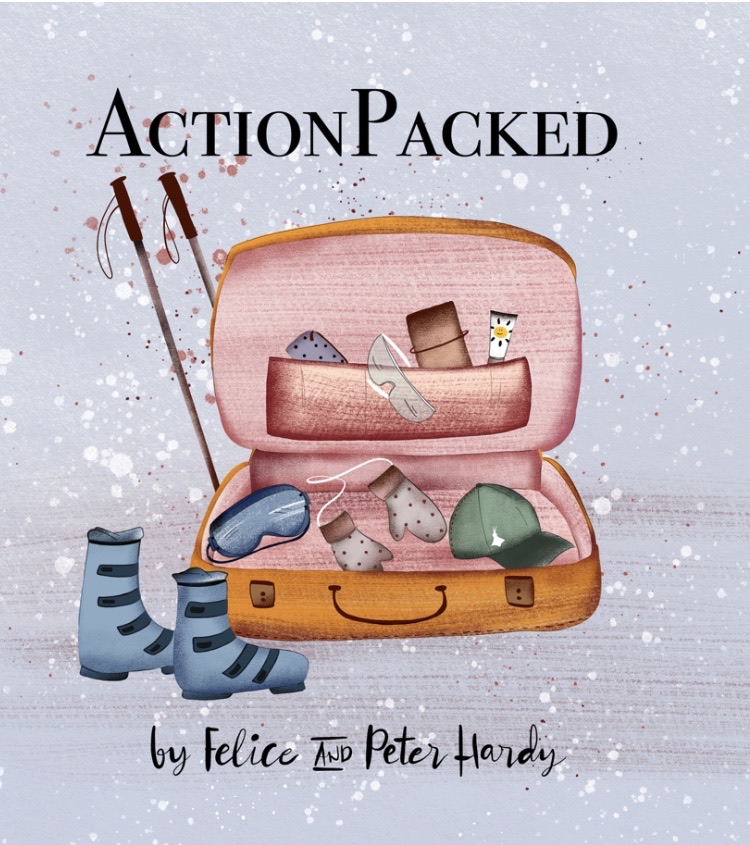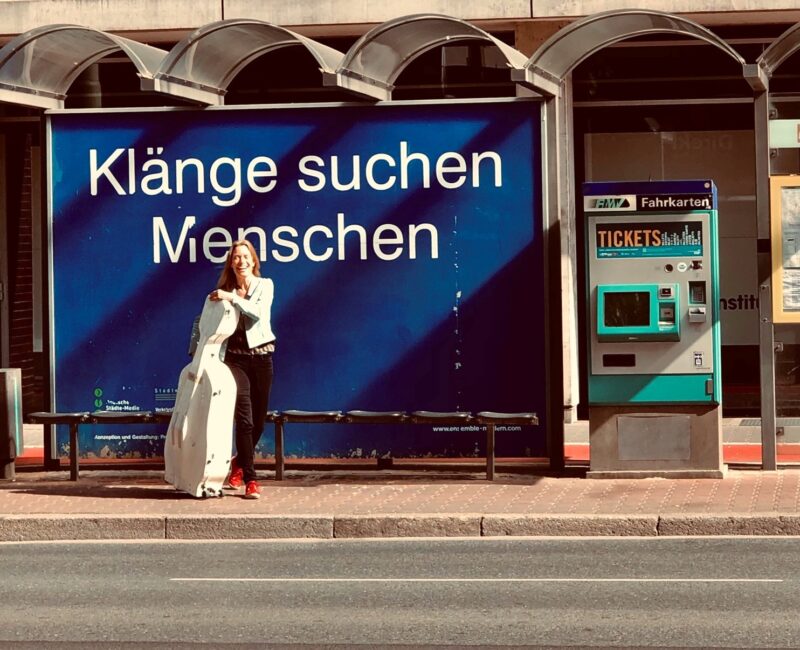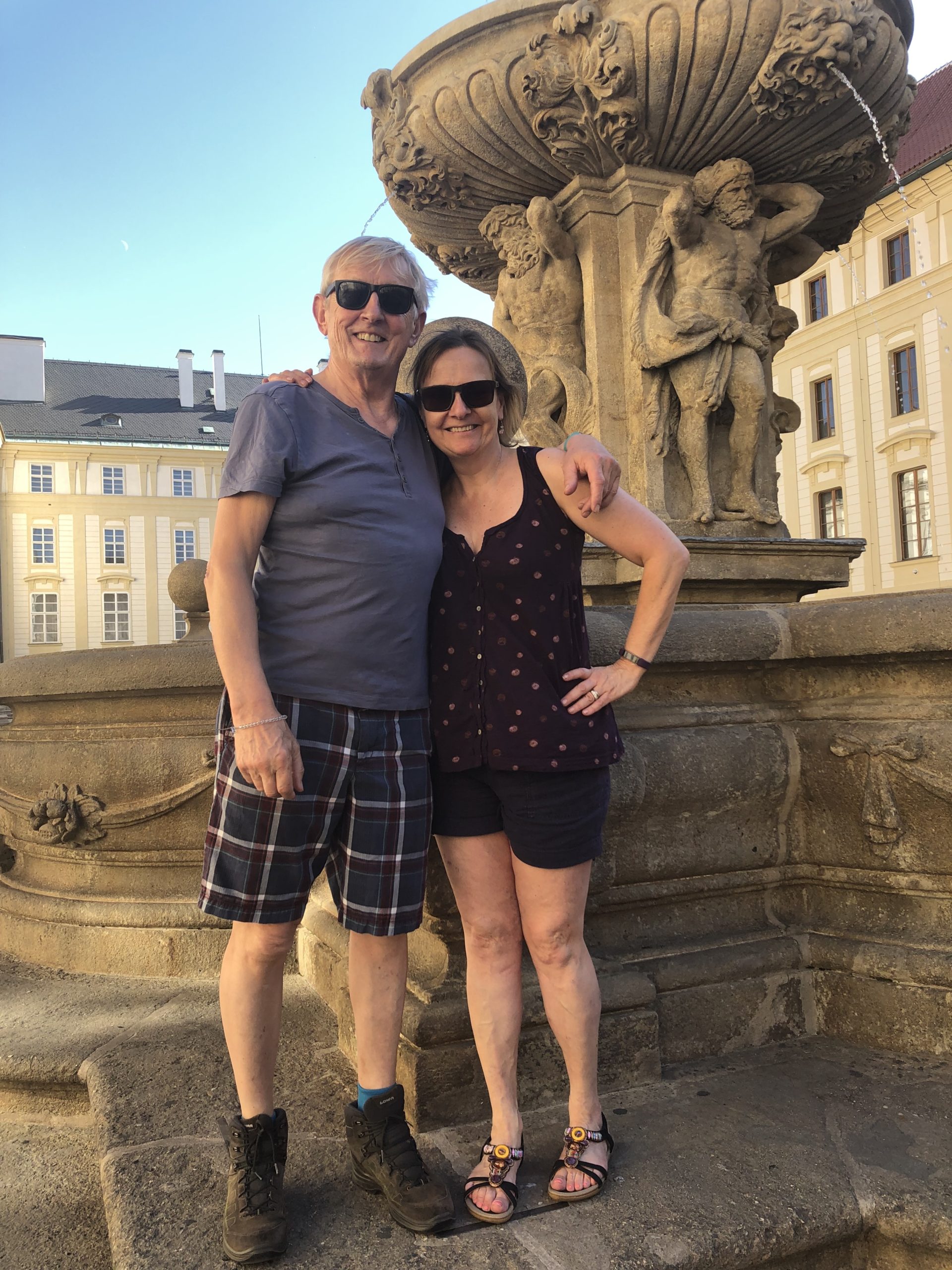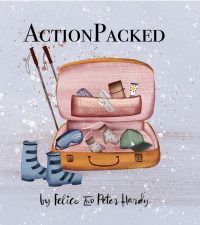
Eva Böcker. Photo: © Andreas Etter
Peter Welcome to our travel podcast. We’re specialist travel writers and we’ve spent half a lifetime exploring every corner of the world.
Felice So we want to share with you some of our extraordinary experiences and the amazing people we’ve met along the way. This week, Peter and I are talking to the contemporary classical cellist, Eva Boecker. She’s one of 19 solo artists from nine countries, and they’re based in Frankfurt. They’re called Ensemble Modern. Every year, the group performs about 100 concerts in Europe and all over the world.
Peter I guess that being constantly on the road is a kind of whirlwind existence, but whenever Eva leaves home in Germany, when she’s dashing to the airport or the train station – yet another journey to another distant venue somewhere in the world, she at least knows who, or rather what, will be sitting beside her in the next seat. It’s her beloved 300-year-old cello, which she describes as a member of her family.
Felice Welcome to our podcast, Eva.
Eva Thank you, it’s lovely to be here. Thanks for inviting me.
Peter It’s a pleasure. And where are you at the moment?
Eva Well, I live in a town called Karlsruhe, which is in the southwestern part of Germany. And I just got back home from Frankfurt, which is where I work.
Felice Are they far from each other?
Eva It’s a train train ride of about an hour and ten minutes. Altogether it takes me about one and a half hours and I don’t have to go into work every day, so it’s perfectly doable. I think for Londoners, for example, it’s quite normal to travel to work for that long.
Peter But it was pre-pandemic, but now everyone works from home.
Eva That’s true yes, but I can’t do that.
Felice Not in a job like yours.
Eva No, that doesn’t really work.
Felice Tell us a bit about what you do.
Eva I’m a cellist and I play in a classical music group called Ensemble Modern. We play mainly contemporary classical music, so that means we do lots of premieres by living composers, but also music from the last 100 years, something like that – so Schoenberg and Bartok and all those composers. We do our rehearsals in Frankfurt; the group is based there but from there we do a lot of travelling, obviously to concerts, mainly inside Europe.
Felice When did you first get involved in the cello?
Eva Well, I studied the cello after I left school in England. I studied the cello in Cologne, which has a huge music school ,and at the end of my studies I was asked to do a project with this group. I’d heard of them but I’d never really done any contemporary music, I wasn’t at all specialised in that kind of music, and I just enjoyed playing with the people and also the music we played. It was great fun and we went on a small European tour and I thought, ‘Oh, that’s the kind of thing I’d love to do.’ Then they kept asking me back, and six months later they said they’d decided to create another cello position. So I did an official audition and then I got the job, which was great and it was really funny because I’d never planned to do anything like that. I think it’s partly that it was it was such a new world to me, all these new discoveries and also the people who were absolutely really lovely.
Felice How many of you are there?
Eva There are 18 musicians and five string players and other percussion players. We’ve got pianists, too, and some wind players.
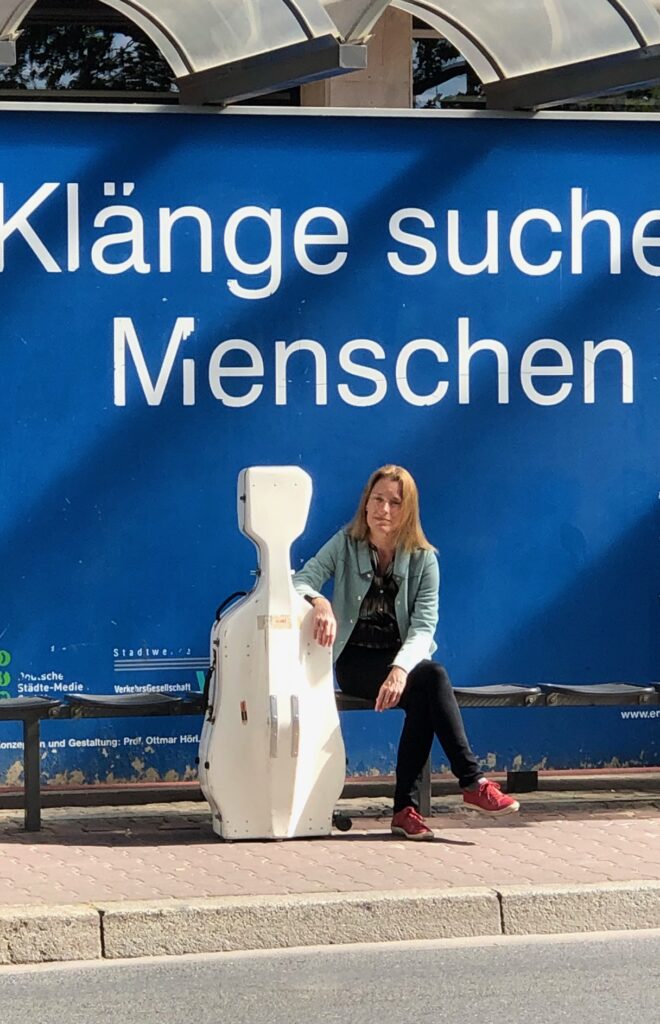
Peter I should just point out before we go any further, that it’s quite confusing for our audience because you have the perfect English accent. It’s absolutely without a trace of anything else, but you are in fact German, aren’t you?
Eva Yes I’m German, but I moved to England for the first time with my family, with my parents, when I was four years old. So I suppose that’s explains the accent, and we lived in London until I was about nine and then we moved back to Germany and then we came back. So I actually spent quite a few years at school in England. I first went to the German School and then to a specialist music school actually, called the Purcell School, which I loved. I decided to stay on when my parents moved away – actually, they had a boarding house and I decided to stay and finish school there.
Felice So when did you discover your talent?
Eva Well, I suppose that was quite early on; I don’t really remember. I started the cello when I was about six, and I didn’t choose the instrument – it was just that there was a cello teacher who lived down the road and this lady’s sister was a violin teacher, so my brother and I were told to learn violin and cello. And it was all sort of decided for us and I loved it from the first moment. I mean, my earliest memories are all about music in some sort of way; they all involve singing or listening to music. My talent, well, I suppose I gradually realised that was something I was quite good at and I know that I basically decided to become a musician when I was twelve. So pretty early on.
Felice That is early.
Peter Do you play other instruments?
Eva Well, I play the piano because you have to have a second instrument, but I’m not very good at that. But it’s useful to be able to play the piano a little bit, especially as I did teach for a while, but I haven’t really been practising the piano at all. So I’m very much a cellist.
Felice And do you come from a musical family? Because obviously I’ve known your sister for years and, as far as I know, she’s a scientist rather than a musician.
Eva Yes, absolutely, but she is very musical. I can tell that from the way she sings and she loves music. And the same goes for my siblings and my parents. Music is certainly very important to my mother. So she was the one who would say, ‘Oh, have you practiced yet? It’s quite late; you should get started,’ and that kind of thing. She really encouraged music. But there are no other professional musicians in the family.
Peter Travel is in the blood, I think. Your father was a diplomat?
Eva Yes, that’s right. My father was in Yemen – it was then South Yemen – from 1966 until 1969. So I spent my first years there, but of course I don’t remember a thing. Then we moved to London and then to Germany, and that was when the capital of West Germany was Bonn, so we lived in a fairly small town, and then back to London. Then, as I said, I stayed in England, but my parents moved to Brussels and then to Iraq, so I would go visit them there during my holidays.
Felice Well, that’s quite a mixture of places.
Eva Absolutely, yes.
Peter You’re a great linguist, obviously. You are bilingual in German and English and you speak French as well?
Eva Yes, but I learnt that much later. I got a job teaching in Strasbourg – and Strasbourg is actually not far from where I live. Karlsruhe is quite near the French border and we have a fast train connection, the TGV, which goes directly to Strasbourg. It’s only, I think, a 40-minute train ride, so that was really practical. For quite a few years I commuted from my home in Karlsruhe to Frankfurt for rehearsals with my group, and then to Strasbourg for teaching. But that all became a bit much after a while, and I gave that up two years ago. I’m not a teacher anymore; I play. I had to choose between the two, which wasn’t easy because it was a job I really enjoyed as well. But I couldn’t imagine not playing anymore; that’s really important to me.
Felice And you’ve lived in Paris as well, haven’t you?
Eva Yes, for a few years, near Paris. So that was really difficult because I had my job in Frankfurt during that time, so the travelling was just too much after a while.
Peter And I imagine particularly difficult with a cello?
Eva Absolutely. Travelling with a cello – that’s a whole big story. I’m sure one day some famous cellist is going to write a book about it. It’s much easier now than it used to be.
Peter How do you go about it? I mean, do you book a seat for your cello or what happens?
Eva Yes, there’s no way around it now. When I was a student there was no question of buying a seat for the cello, I just couldn’t afford it. I would risk just taking it along and it always worked out somehow. There was often a lot of hassle, but the security wasn’t so strict in those days, so they would let me take the cello to the gate and then give it to the person who would actually load it onto the plane. Sometimes they would even let me walk right up to the plane, right up to the hold, and I’d watch them put my cello into the hold.
That is just out of the question now, of course, absolutely impossible. But the funny thing is, even though my ensemble buys a ticket for my cello now, it’s not really any easier than it was before – there are always some kind of problems. Either they haven’t got the right computer programme to recognise the cello’s ticket, although it says extra luggage or – I don’t know what it says, but they have a particular name for an extra seat if you have some bulky luggage – but there’s always some kind of a problem.
Or sometimes they come to the gate and say, ‘Ok, we need a specialist to tie the cello down on the seat,’ which is quite strange really, because all you need really to secure a cello is an extension to the seat belt, which they all have, and it’s a matter of 20 seconds really. But sometimes they insist that it has to be a specialist, and I’ve had some really strange stories. Once they took…I don’t remember which airline it was…but it took them about half an hour to tie down the cello. Then when I sat down next to it, I just touched it with my little finger, literally, I hardly touched it and it all fell apart. So yes, things can still be quite complicated.
Peter But you’ve never been parted from it?
Eva No, so far I haven’t had any really disastrous stories happen.
Felice If it goes in the hold can the cello get damaged?
Eva Well, it doesn’t go in the hold any more because I won’t risk it. My cello is a lovely old Italian cello from 1720, and I’ve had it for 35 years, so it’s sort of part of me, really, and I just wouldn’t put it in the hold anymore. I wouldn’t risk it. But as I said, when I was a student – it wasn’t the same cello I had then – but I did put it in the hold and I was just lucky that nothing ever happened. But it gets very cold of course, in the hold, and also you just don’t know how they handle the instrument.
Peter Well, judging by the amount of lost luggage there is in the world today with airlines, it’s probably not a good idea at all.
Eva Exactly. No, I definitely wouldn’t risk it. But I have to say, I don’t do a lot of flying anymore with the group or even privately. Most of our concerts are in Europe and we only travel to other continents maybe once a year. The group just got back from Japan, but it’s fairly rare. So obviously we fly to places for like Vienna. From Frankfurt to Vienna is the sort of a distance that’s a little bit difficult to do by train. It would just take us too long. But we often play in Berlin, Cologne, Paris, Amsterdam, and we do all that by train. The connections are so much better now than they used to be. Frankfurt is actually a very practical place for us to have our base because it’s in the middle of Germany and pretty much in the middle of Europe, actually. So quite easy to get everywhere.
Felice You’ve also been on tour, though, to Japan and Korea and places like that, haven’t you?
Eva Yes. So we’ve been to…actually I’ve never been to Korea with the group but there are two cellists in the group and often only one of us has to play, so I don’t do every single concert. But I’ve been to Japan, to China. We went to the States a few times – that’s quite a while ago – we haven’t been for a while. Mexico, Brazil, South Africa, lots of really interesting trips.
Of course, those trips tend to be more memorable than going to Berlin because we go there all the time. Also I found that when we go to places we haven’t been to before, the group tends to stick together more. So we go around in groups and we go and have meals together and it’s quite a different atmosphere. Whereas if we travel to Berlin, everybody has friends there, everybody does their own thing and we just come to the rehearsal and play the concert. But it’s always very special when we go to somewhere else, somewhere further away.
Felice Do you have any particularly memorable experiences in any of the places, anything funny, or something that went wrong?
Eva Oh yes, I’m sure there are quite a few. For example, I think it must have been in 2010 we had a concert in Istanbul and that was a lovely trip. We also had some free time there, so it was really nice. But then on the evening just before the concert, we heard that there was this problem with a volcano in Iceland – and I don’t know if you remember that: air travel was enormously disturbed all over Europe – and we realised that we wouldn’t be able to get back. We didn’t really know what to do because we had to get back for a concert in Germany which was, I think, three days later. So it was a bit of a difficult situation.
So we stayed on one day thinking maybe it would be over then, but it wasn’t over for ages. Then we decided to take a bus all the way back to Frankfurt. We didn’t have time for a comfortable trip. We actually took a regular bus; we went to Bulgaria, to Sofia, by public bus. Then luckily our trumpeter is from Bulgaria and his brother arranged a really nice dinner there for us which lifted our moods, and we went to a lovely restaurant called Pod Lipite. I remember that it was really wonderful with live folk music, traditional Bulgarian dishes. After that we took a coach to Frankfurt and it was really tiring, it took us 42 hours altogether. Apart from that break in Sofia, we only had very short breaks.
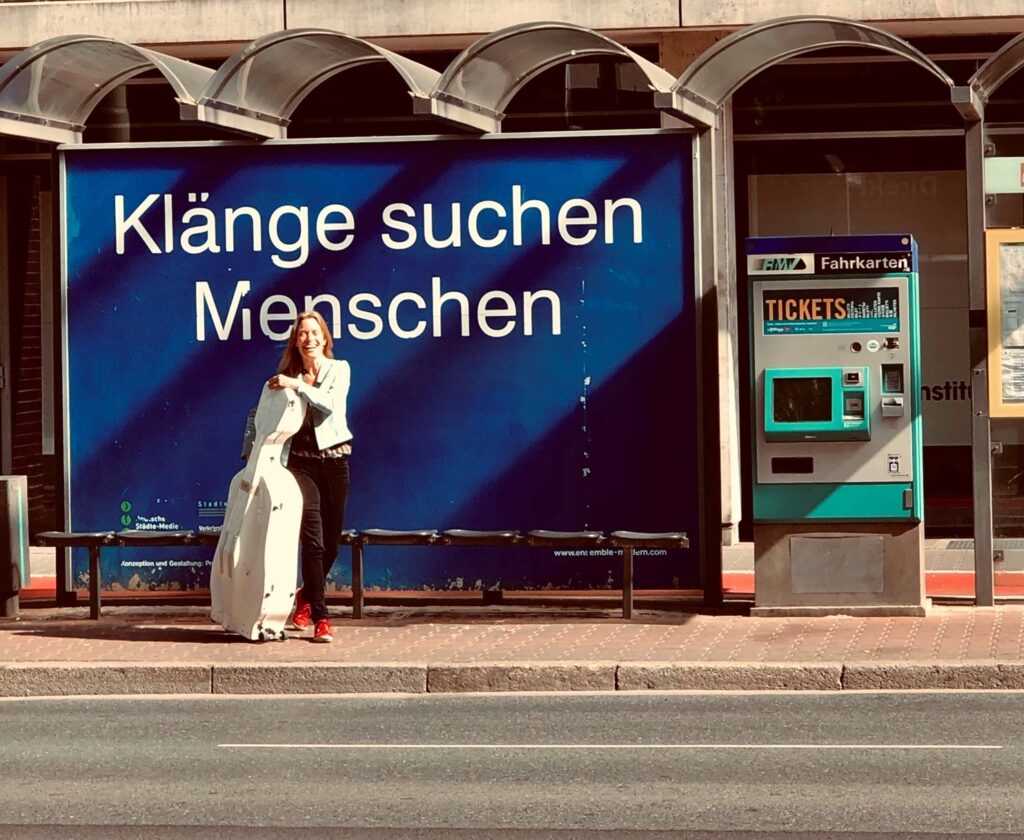
Felice But getting all your instruments onto public transport…
Eva Yes, that definitely that was quite something. That first bus was definitely very, very full. But I think we had some separate transportation. There were some large percussion instruments that needed to be transported and we did have a lorry in Istanbul and we basically put everything we could onto that lorry. Obviously those things arrived, probably around about at the same time as we did. The lorry was there anyway, so that really wasn’t a problem.
I remember the border to Serbia was quite interesting as well, because the border guard came into the bus after quite a long wait. We’d been waiting for it for about an hour or something, and the border guard came in and said, ‘Where’s the flautist?’ We were very puzzled and our flute player looked worried. But anyway, he said: ‘Can I see your flute?’ So he reluctantly showed him his flute and the guard opened the flute case, put the flute together and started playing on it. It was quite funny, except that our flute player wasn’t very amused because musicians don’t really like to have other people play on their instruments. Partly, probably because you worry that something could happen, that they could drop it. So he wasn’t very happy, our flute player, but it was it was quite a funny situation.
Felice I think you were once caught in China during another epidemic?
Eva Yes, that was Taiwan, actually. That was a terrible story because it was a huge project, a festival. The group was featured at this festival so we had something like five concerts planned, big programmes. One of the programmes was music, theatre and the whole setting of this theatre, the whole stage setting, had to be taken over. The whole thing cost a fortune; it was really expensive. We got there and some of the musicians from the group had been to Korea just before, and it turned out that somebody who was on that flight from Korea to Taipei had been infected with SARS, which was actually…COVID is SARS2, isn’t it? So that was SARS1…so actually all the people who were on that flight had to go into quarantine.
I was lucky because I was allowed to travel home immediately, but all the concerts were cancelled and it was an absolute disaster. You can imagine the amount of money that was lost and all this travelling for nothing; it was really quite depressing. But at least I didn’t have to stay in the hotel for a week like the others. We were allowed to come back a year later and do – not all the concerts, but at least a couple of concerts – so that was that was nice.
Felice And you have two children, don’t you?
Eva Yes.
Felice Are they musical as well?
Eva Yes. My daughter plays the violin and she studies music in Berlin, and my son Pierre plays the cello but he decided not to do it professionally, although he enjoys it very much. He studies law in Cologne now. Of course, that was another thing: travelling as a musician with family and children can be quite difficult. Yes, summer projects were sometimes difficult because you want to go on holiday when they’re children. So luckily some of the music festivals, the big music festivals are actually in very beautiful places. So sometimes we combined holidays with my work. The big festivals are, for example, Salzburg or Lucerne – places that are in beautiful settings with mountains and lakes. I quite often took the family along and that worked really well. Lucerne is a beautiful city, the town itself has a lot to offer: a beautiful old centre, the lake is wonderful, and we stayed just outside of town and had a lovely holiday flat. I wasn’t on holiday, but they were, so I didn’t feel so guilty.
Felice We used to be the same as travel writers; both of us are travel writers with three children. Sometimes we used to take them with us, or otherwise one of us would go and the other one would stay behind.
Peter Well, we always say we were a bit like the family Von Trapp, but you are much more like that family.

Photo: © Ensemble Modern
Eva Yes, especially because we used to go to Salzburg regularly. And that’s a lovely festival too. And Salzburg is great for all the lakes, I don’t know if you know the region. One of the most memorable trips for me was a trip to New York once where I took my daughter along, who was nine years old at the time, and it was during her half term and we were there for a week. She still talks about now because I had concerts in the evenings and I was free all day, so we walked around New York and we stayed in a really lovely hotel with a swimming-pool on top, and it was just the best holiday she’d ever had, she said. It was just wonderful. That doesn’t happen very often though, because normally we travel, if it’s not too far away from Frankfurt, we travel in the morning, we have a dress rehearsal in the afternoon and then play concert, which is really tiring, so there’s no time to look around really. Sometimes we travel the day before, but usually there isn’t much time to go sightseeing.
Felice Do you normally travel on a train or in a tour bus or something like that?
Eva We hardly ever have a tour bus, it’s usually by train. I actually have a very special train ticket; I’ve had that for the past three years. I don’t know if you have that in Britain – it’s we call it the Bahn card 100. That means I can take any train anywhere for a year and I don’t ever have to buy a ticket. I can even use buses and trams. Of course it’s quite, quite expensive, but it’s really worth it. It’s a luxury not to have to buy tickets.
Felice I haven’t heard of anything like that, but maybe we’re stuck in England…
Peter I’m sure we don’t have anything like that.
Eva Yes, I do everything by train. I go to the rehearsals by train, I do my private travelling as well…visiting friends. I do have a car, but I hardly ever use it anymore.
Felice You’re very environmentally friendly.
Eva Yes.
Peter So you hear lots of stories over the years of people who absentmindedly leave their Stradivarius in the luggage rack, but you’ve never had that problem because you’ve got such a big instrument. You would not walk off without it.
Eva Exactly. really do think that’s the reason why that’s never happened to me, because it’s the kind of thing that could happen to me but a cello is just too big. But I have friends and colleagues who’ve had really terrible moments.
A colleague of mine left his violin on a train in Germany and another colleague of mine – actually, it has happened to a cellist – left his cello on a train and it was lost. It was a really strange story because they said it had never arrived where he thought it would arrive, you know the train stopped in Luxembourg, and they said they didn’t find a cello there. He got a phone call five years later from Luxembourg saying, ‘We have your cello.’ That was very strange. But by that time, of course, he’d bought a new cello and a new bow and everything, so his old cello went to the insurance company.
Peter I think somebody had probably been playing it happily for the past five years.
Eva Hopefully playing it. He thought that probably somebody tried to sell it and it didn’t work. Because it’s very difficult to sell a stolen instrument because violin dealers, they know about these things and you can easily recognise an instrument. And musicians usually have photos of their instruments, so it’s not easy at all to sell one.
Peter Tell us about your cello. It’s a fabulous age.
Eva Yes, 1720. It was made in Rome by a violin maker called David Tecla. It’s not an Italian name, but he’s considered an Italian violin maker. It’s also beautiful to look at. It doesn’t just sound lovely, but it’s a beautiful wood and a lovely varnish and I’m really lucky to have that instrument. So it’s part of the family, really – as I said, I’ve had it for a long time. Of course, it’s very fragile as well, so I’ve got a very good case – made in Britain actually, they’re very famous the English cello cases, because it’s very important, because if it falls over and the neck breaks then that can be a huge problem and it will take months to repair. I love it very much; I don’t really want to imagine having to switch to another instrument one day. I think I’ll just keep it forever if I can.
Felice What are your plans for the future? Where do you see yourself in a few years’ time?
Eva Well, I think I’m so happy in my group, I just have lovely colleagues and we have a lot of fun also, there’s a lot of humour in the group, which I think is very important when you play a lot of contemporary music, because some of the stuff we play is really wild and incredibly difficult and you can get quite stressed about it at times. So it’s really nice to feel good in this group. I think I’ll keep doing that for as long as I can, although I can imagine maybe doing a little bit less in a few years’ time because it can be quite a lot at times. I’m beginning to think that a little bit more free time could be a good thing for me. But luckily, as I said, there’s another cellist and we don’t always have to play every single project. And even if we both can’t play, for whatever reasons, there’s the option of asking a guest every now and then as well, so it’s quite flexible really.
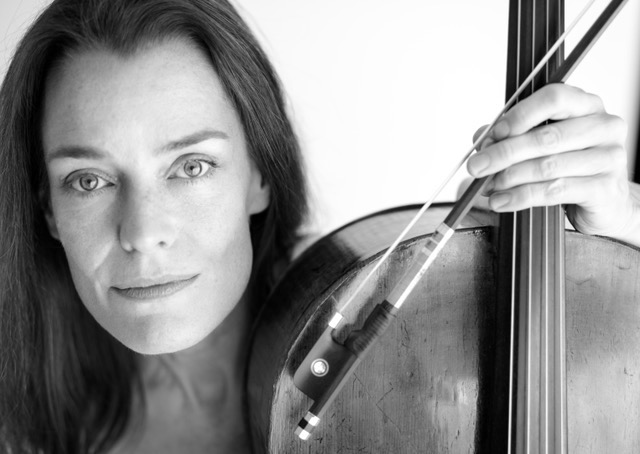
Photo: © Sheona Ann Photography
Felice Is there any music that you listen to apart from cello music or classical music? Do you listen to any other?
Eva Yes, definitely. I love to listen to pop music; I listen to some jazz as well, but I love the sort of funky seventies stuff which has nothing to do with the music I play. Although some of the music we play is sometimes a crossover between jazz or pop and classical music.
The group actually worked together with Frank Zappa a few times – unfortunately that was just before I joined, but of course I’ve heard a lot of stories about it and we’ve made some CDs also with Zappa’s music, who was an incredible musician and he wrote classical music as well, which a lot of people don’t know. It’s really, really clever stuff. So yes, we’ve worked with musicians from jazz groups: John Scofield, for example, from Weather Report. Actually I don’t really feel like I specialise in one particular kind of music: it is contemporary music, but there are so many different styles inside contemporary music. I don’t feel limited really as a musician.
Felice Do you have any tips for people who might want to do what you do?
Eva Well, the way into the music scene, well, the classical music scene in general, the only way is to start really early. Because so much, unfortunately, I have to say, so much is decided so early on – it’s really quite difficult these days to get a job in any orchestra. It’s much harder than it used to be, so everything counts – which college you study at and the stuff you have on your CV. The earlier you start your experience as a musician, the better. And anyway, for string instruments, you really have to start very early. Wind players sometimes start later, so that’s fine. But if you haven’t played an instrument by the time you leave school, you can’t just decide out of the blue to study music – that isn’t really possible.
Peter Do you practice every day?
Eva Well, there isn’t time every day, because when we rehearse all day…for me, rehearsing and practicing is not really the same thing. I do need my individual practice at home. Professional musicians generally can’t do that every day anymore because there isn’t the time. But yes, I do need to do that very often, depending on the programmes I have, the pieces I have coming up. Sometimes there’s nothing terribly difficult for a while, so I can take it easy for a few weeks sometimes, but then it can be very intensive as well. And sometimes I have to practice for many hours every day just for one single piece…for weeks. So it really varies a lot according to the programme.
Peter I once interviewed Segovia, who was perhaps the greatest classical guitarist of the 20th century, and he came from the Basque Country. And after the horrors of Guernica and the Spanish Civil War, ha said: ‘I’m never playing my guitar again. I’m finished.’ He didn’t play for two years. He said after that, when he took it up again, the pain was so great in his hands that he swore he would never go see the day of his life without playing.
Eva That’s interesting. It’s pretty much the same for cellists, because of the pressure it’s actually quite hard work, actually, just pressing the strings down with the fingers of the left hand, much more than on the violin, for example. So if you stop playing for two weeks, it can be quite painful afterwards. Yes, that’s true, definitely.
Felice What else do you do when you’re not playing music? Do you have any hobbies?
Eva I love to dance. I never learned the standard dances, I don’t know anything about that, but I just love to move to music. But I don’t go dancing; unfortunately, there aren’t many parties anymore these days when people dance, I really miss that. I wish there were more, but sometimes when my children are here, we’ll just put on a CD and dance together and I could do that for hours. That’s something I really, really love doing.
Felice If people want to find out more about you, do you have a website or somewhere they could look?
Eva Yes, there’s a website called EnsembleModern.com – the Ensemble Modern website has just been redone; we’ve just done a relaunch, so there are lots of videos you can have a look at. Of course, there are some videos on YouTube that you can find.
Peter Eva, Boecker but thank you very much for coming on the show. We wish you the very best of luck in the future with your travels and, of course, with your music.
Eva Thank you very much for having me. It was a great pleasure.
That’s all for now. If you’ve enjoyed the show, please share this episode with at least one other person! Do also subscribe on Spotify, i-Tunes or any of the many podcast providers – where you can give us a rating. You can subscribe on Spotify, Apple Podcasts or any of the many podcast platforms. You can also find us on Twitter, Facebook and Instagram. We’d love you to sign up for our regular emails to [email protected]. Until next week, stay safe.
© Action Packed Travel

- Join over a hundred thousand podcasters already using Buzzsprout to get their message out to the world.
- Following the link lets Buzzsprout know we sent you, gets you a $20 Amazon gift card if you sign up for a paid plan, and helps support our show.
